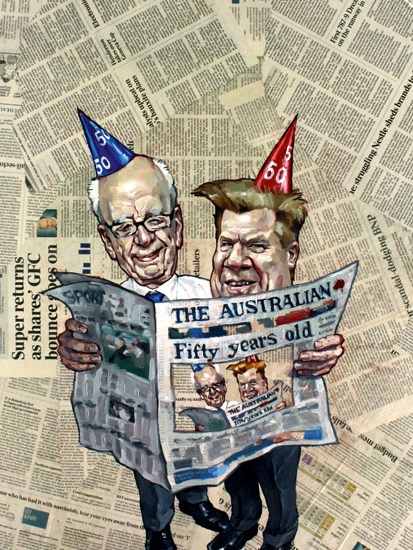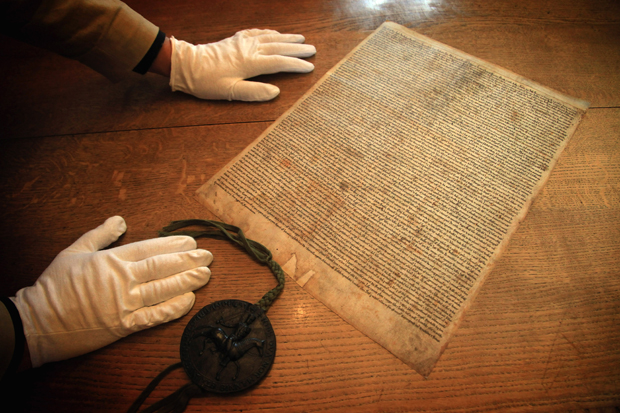Who would have thought, 50 years on, this country would still be talking about the Australian? When Rupert Murdoch started his national daily broadsheet in 1964 most people would have been impressed by its sheer gall but few could imagine what this little paper from the son of Sir Keith Murdoch would become. Our own paper of record and a darn good read every day.
Murdoch launched his paper on 15 July 1964 from the nation’s capital Canberra. If it is a miracle News Corp’s flagship still exists in the digital age, it was pretty much a miracle it survived back then too. Murdoch’s paper didn’t rely on advertising the way the other newspapers did and its distribution nationally was difficult to say the least.
Murdoch and the paper’s staff didn’t always agree in those early days. Most notably there was the 1975 election strike by News Limited journalists who were displeased with Murdoch’s activism against the Whitlam government. It was a short tiff between father and child but it was an important moment, highlighting the courage and chutzpah of a new breed of Australian journalists Murdoch clearly spotted were the best. The Australian’s roguish, independent nature is its star quality, giving that edge of personality so many newspapers worldwide sorely lack.
With hearts of gold and minds sharper than a Labor backroom boy’s knife, the journalists carrying this banner continue to impress and dazzle readers. The names of the writers who found their voices on its pages are legion. Names like Paul Kelly, Caroline Overington, Greg Sheridan, Stuart Rintoul. The list stretches on.
And yet the Australian remains a symbol of derision and outright bile for some. The ranks of the Australian Left have pitted themselves (somewhat needlessly) against the Australian and it has courted its fair share of enemies on the Right too. What its antagonists fear — especially under Chris Mitchell’s tenure as editor-in-chief — is that combination of intellect and guts so rarely seen in a 21st-century newspaper. The heavyweights who write for the Australian are no tabloid redneck populists, but don’t expect to see wishy-washy liberal dreamers in its pages either.
Think of Janet Albrechtsen, the Left’s favourite bogeywoman. Read her closely and you see a woman with a brain the size of our continent and the style to match. Few columnists can rouse the passions of a reader on topics like proportional representation or the United Nations bureaucracy the way she can. Even fewer could take on former Prime Minister John Howard — as she did when she told her biggest fan to move aside in 2007 for the sake of his own party — and come out validated.
Add to that list the likes of tough-as-nails economist Judith Sloan and press gallery doyenne Niki Savva. These women are real conservative intellectuals. Guardians of common sense in our all too conformist political sphere and they fear no man, Labor or Liberal.
As for the constant search for the ABC’s right-wing Phillip Adams, one can’t help notice that the paper’s left-wing answer to Janet Albrechtsen is actually… well, Phillip Adams. A rather greater range of opinion is welcome at the Australian for all its conservatism.
And think of the quality of the best reporting. Hedley Thomas’s work in 2006 uncovered the Howard government’s bungling of the case against Dr Muhamed Haneef, an innocent doctor accused of connections to terrorist attacks in Scotland. The leakage of an AFP interview transcript to Thomas was one of the factors in the eventual release of Dr Haneef. His current work on the dodgy dealings of that parliamentary clown Clive Palmer is currently gripping the nation.
Then there was Caroline Overington — now at the Australian Women’s Weekly — and her relentless pursuit of the Australian Wheat Board story, coming up against that terrifying combination of Canberra bureaucrats and Saddam Hussein’s bully boys. The Oz was a big editorial supporter of the ‘Coalition of the Willing’ in 2003, but also the biggest critic of the Howard-Downer policy of wheat kickbacks to the Iraqi dictatorship.
Perhaps the Australian’s most lasting legacy will be its tireless coverage of Indigenous affairs. It started in 1967 with its backing of the referendum to remove the right of the federal government to make ‘special laws’ for Indigenous people and continued decades later with its calls for John Howard to make an apology to the Stolen Generations. It continues to this day with Victoria bureau chief and star reporter Patricia Karvelas’s expert coverage of Aboriginal affairs reflecting her strong connections to the community we too often look past. And there’s Nicolas Rothwell, telling these stories from the heart of the Northern Territory with such eloquence. If its championing of economic reform is the Australian’s great political legacy, its passionate commitment to the Indigenous community is its great moral triumph.
Does the Australian have its problems? Of course. Recent front-page retaliations against the ABC’s Media Watch didn’t seem particularly newsworthy and the overstated reaction detracted from the very real case the paper had against the ABC. The move to online necessarily threatens the last of the broadsheets and the paywall — adopted now by its old rivals at Fairfax — still provokes debate. As for that old question over objectivity in journalism (unfairly centred on Murdoch’s papers by jealous left-wing competitors), it will always dog a publication with a clearly conservative bent in a country where our intelligentsia tend to be not only liberal but conformist.
But even its mistakes reflect the attributes which make Chris Mitchell’s Australian the best newspaper in the country. Only the national daily has the intellectual and moral authority to stand up to the ABC and in a world still dominated by liberal press pieties, why can’t we accept the fact that the Oz presents a smart, nuanced but rationalist and OK, conservative view of our nation’s issues? But surely this has to be a serious option.
Its current place in our national consciousness has everything to do with Mitchell. The era of the editor-in-chief may be over for so many papers but the tough-minded Queenslander shows why leadership is still a positive boon in modern journalism. He’s been called a cowboy but that’s central to what he brings to this paper. A sense of passion, a spirit of relentlessness and a little spark of pure fun and devilment which readers just keep lapping up. He may rile up the paper’s enemies but those loyal to it know just what he has meant to this publication’s legacy.
This is a moment in time when we should stop defending it and simply celebrate it. The financial question mark will always hang over its head: it struggled so long to make a profit and the digital age has wrought its own kind of damage. But after all the backlashes and the grief, it has soared towards the light where its competitors have faltered and News Corp will reap the benefit after Rupert himself is gone.
The Australian, whatever its faults, breaks news, changes lives and tells the stories we need to hear. Thank heavens we still have such a newspaper in this country.
Got something to add? Join the discussion and comment below.
Get 10 issues for just $10
Subscribe to The Spectator Australia today for the next 10 magazine issues, plus full online access, for just $10.
You might disagree with half of it, but you’ll enjoy reading all of it. Try your first month for free, then just $2 a week for the remainder of your first year.














Comments
Don't miss out
Join the conversation with other Spectator Australia readers. Subscribe to leave a comment.
SUBSCRIBEAlready a subscriber? Log in